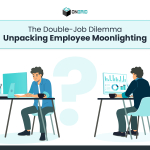It has been a few decades since the background check practices have become a vital part of the recruitment process in India. Candidates do their research in choosing an organization to work with; similarly, organizations conducting a detailed background verification (BGV) has become an accepted norm in the industry. What started out as a practice for white-collar professionals (eg. bankers, consultants, software engineers) has now permeated into blue-collar jobs as well. However, the nature of checks may be different.
A question most HR leaders grapple with the articulation while answering this question – why do we need background checks for employees or contractors?
Well, here is a simple answer. Each of the points below would have deeper reasoning, that gets derived from the processes and methodologies that are followed as part of the BGV process.
- Eliminate the risk of a bad hire
- Maintain a high-quality workforce
- Ensure legal compliance
- Maintain the brand value and reputation
- Enhance workplace safety
- Avoid financial liability
In our experience, we have seen job applications and scenarios, where a layman cannot vouch for the authenticity of claims by the candidate, resume, or supporting documents submitted by the candidate. We have seen a high percentage of discrepancies in employment and education records claimed by white-collar employees, whereas criminal records and fake address discrepancies have been found in many for blue-collar employees. The percentages vary across roles and jobs, and it would not be fair to generalize. The percentages would also depend on the particulars of the checks conducted.
With exponential technological advancements of the 21st century, we have seen a lot more challenging cases coming our way, which a layman cannot vouch for authenticity. We have seen 70% to 80% discrepancies happening in Employment and Education records for white-collar employees, whereas Criminal and Address records discrepancies have topped for blue-collar employees.
Here, we will just summarize at the most common discrepancies that get highlighted and eliminated upon conducting a BGV:
- Mismatch in the period of employment
- Mismatch in remuneration
- Fake salary slips, relieving letters
- Fake education degrees or certificates
- Mismatch in the addresses
- Ongoing criminal cases against the candidates
Once a case is made, the next task for HR leaders is to choose a partner for conducting BGV. But even before that, one needs to understand the cost and assign budgets for the same. One of the common misconceptions is that the BGV process comes with a very high cost, this leads to organizations hesitating from conducting background checks of their new joiners, or making some makeshift arrangements in-house. On running back-of-the-envelope calculations, we realize that the cost of a bad hire is significantly more than spending INR 199-499 for some basic background checks.
OnGrid, with a high degree of automation and digitization in its processes, has managed to cut the costs of background verification, and pass on the cost benefits to its clients!
More importantly, it would be wise to look at the return-on-investment (RoI) element from a different lens. One wrong hire is equivalent in magnitude to not hiring a deserving candidate who can do wonders for your organization. Once you put this in perspective, the decision to set up a BGV program for your organization or startup would seem like a no-brainer!
To get more insights around BGV, or if you wish to conduct BGV for your organization, write to partner@ongrid.in or book a demo now.





Leave a Reply